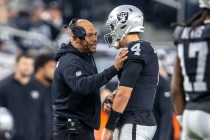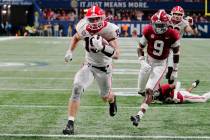Vote snub shines light on flaws in process
Good for Corky Simpson. Not for leaving Rickey Henderson off his baseball Hall of Fame ballot. Not for recanting his stance once bloggers assumed their pious positions and embarrassed the retired sports columnist from Arizona for snubbing the player who on Monday correctly sprinted into Cooperstown with nearly 95 percent of the vote.
Good for Simpson for reminding us again how flawed the process of voting for such honors has become.
Simpson doesn’t represent the entire portrait, just its latest imperfection. He is no worse than those who voted in the Harris Interactive college football poll this season and admitted they never once saw undefeated Utah play. He is no different from the other baseball voters who also didn’t pencil in Henderson’s name.
Which college teams exist among weekly Top 25 rankings and what names are inscribed onto such individual awards as the Heisman or Wooden or NFL MVP or a towering honor like a Hall of Fame plaque always has been a subjective process.
More and more, it’s also becoming a laughable one.
Opinions define sports. They are what cultivate Internet chat rooms and fuel talk radio. They are as much part of the equation as the players and games themselves. Without them, sports would be like watching a continuous showing of “The English Patient.”
People want commentary, analysis, attitude. Then they want to tear it all down with their own beliefs. Fine. Great. That’s what makes it all so compelling.
But like Internet message boards where spineless posters insult and disparage others without using their real names, taking poll or award results too seriously isn’t worth the time or effort.
Let’s consider three major groups that most often vote.
The sanctimonious: Media.
I vote in the Associated Press Top 25 weekly basketball poll and have cast ballots for the Heisman and Wooden awards and countless All-American teams. I also realize my estimations of such things are not superior to anyone else who simply pays attention.
But mine is a business where egos have exploded over time like an M100 on Fourth of July. The arrogant way in which many writers or broadcasters approach voting is absurd.
There is no greater example of this than the Hall of Fame for any sport, when countless media members have for years labeled athletes not good enough for first-ballot inclusion, but as ones who might be worthy of their vote in later years.
Hint: The person is either a Hall of Famer or isn’t.
It’s a good thing for Jim Rice today that enough of those self-righteous baseball writers who kept him out of the Hall apparently fell off the map so those with a clue could right what had been a 15-year wrong.
The devious: Coaches.
You would think this the best group to vote in polls and for awards. They know their particular sport better than most and have to scheme against and prepare for opposing players. They live, breathe, eat, sleep, obsess over every detail.
This is the worst group.
What they search for in officials — impartiality, neutrality, fairness — is exactly what coaches prove incapable of exhibiting when voting.
Take the Top 25 in college football and basketball. Coaches purposefully elevate teams they play (both in and out of conference) to help strengthen the perception of their own programs, because poll results often have a direct influence on a coach’s compensation package and what recruits might be interested and potential postseason placement.
Coaches are just as blatantly biased when it comes to voting for all-conference honors, where they constantly under-value opposing players that might be challenging one of their own for a certain honor.
Many coaches are also so absorbed with their own team and its next game, they have a member of their staff or the school’s media relations department staff fill out the weekly ballot and submit it under the head coach’s name.
The one faction you think should vote has no business doing so.
The indifferent: Players.
This group tends to work out most of the time. There might be agendas present, but for the most part athletes select the most deserving recipients, be it for the Pro Bowl in the NFL or past Heisman winners deciding the current one.
You just don’t want many athletes having to decide awards or honors with specific historical significance.
When that happens, we are reminded of when Shaquille O’Neal looked at Lenny Wilkens, a basketball Hall of Famer who made nine All-Star teams and ranks among the all-time leaders in assists and said: “Coach, you played?”
Some voters don’t follow things closely enough. Others refuse to include entire eras of a sport (see baseball and steroids) in the process. Whatever the reasoning, the entire process has become less and less legitimate based on who’s deciding the outcome.
Then again, 23 people didn’t vote for Willie Mays on his first and only Hall of Fame ballot in 1979, so this might not be such a new problem.
Polls and awards should hold a place for all those not intimately involved.
Just not a serious one.
Las Vegas Review-Journal sports columnist Ed Graney can be reached at 383-4618 or egraney@reviewjournal.com.


















